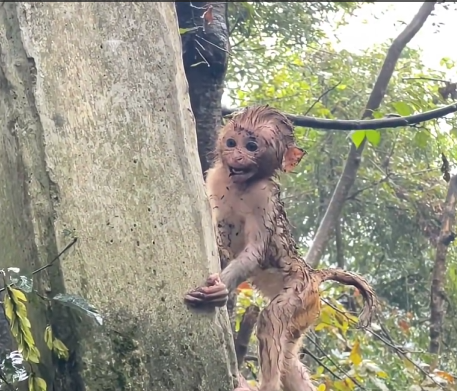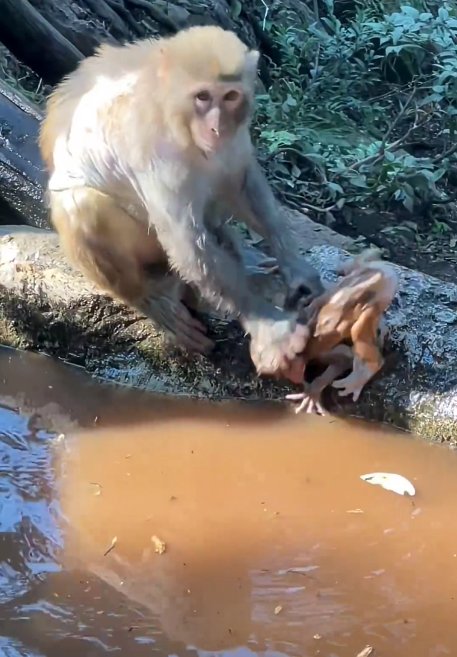
In the dense, untamed heart of a tropical jungle, life thrived in its own chaotic rhythm. Trees towered like ancient guardians, rivers wound their way like silver snakes, and animals of every size, shape, and temperament moved in a delicate balance between survival and instinct. Among these creatures, the monkeys were some of the most social and expressive, swinging through the canopy, chattering and squeaking in endless communication. Yet beneath this vibrant life, there existed harsh realities—truths not often spoken about, even in stories of the wild. Not all parental care was nurturing. Some, like in human societies, could be cruel, neglectful, or abusive.
In a small troop high in the canopy lived a young monkey named Kiko. Kiko was playful and curious, eager to explore the jungle, swing from branch to branch, and learn from his mother. But his mother, Mara, was harsh and unpredictable. Unlike the gentle matriarchs in other monkey families, Mara often scolded Kiko for minor mistakes, pushing him too hard, or denying him affection when he sought comfort. Her sharp gestures and piercing screeches were intimidating, leaving Kiko hesitant, fearful, and confused. He did not understand why the same mother who fed him could sometimes become the source of his pain.
Other members of the troop noticed Mara’s behavior. Some whispered quietly, shaking their heads at the sight of Kiko being scolded for failing to catch a falling fruit. Older monkeys remembered that Mara herself had been raised in a strict, harsh environment, and many believed that the cycle of abuse continued because she had never learned a gentler way. The jungle, for all its beauty, had lessons that were often brutal, and parental behavior among animals could reflect this harshness.
Kiko’s situation was not unique. Across the jungle, there were stories of young animals suffering at the hands of their own parents. A tiger cub, pushed to hunt before it was ready, stumbled and cried while the mother growled in frustration. A fawn, accidentally straying from its mother’s side, was harshly scolded, causing it to tremble in fear. Even birds sometimes abandoned chicks who failed to fly quickly enough. Survival instinct, competition for resources, and parental frustration often manifested as mistreatment. In many cases, the jungle’s version of “abuse” was a cruel mix of natural instinct and social hierarchy.
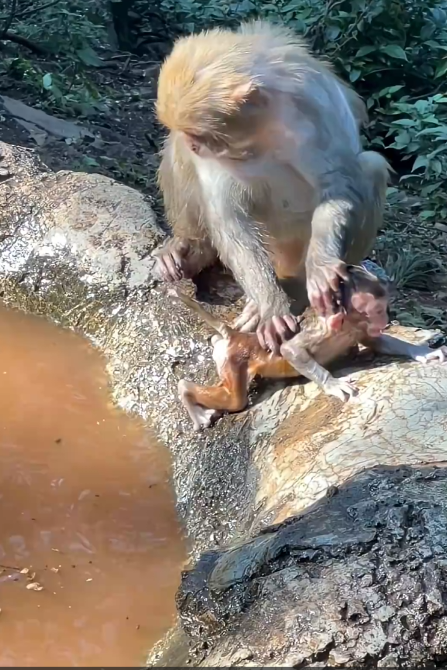
For Kiko, each day was a struggle to balance obedience with curiosity. He wanted to learn, to play, and to explore, but he feared his mother’s wrath. One afternoon, while climbing a particularly tall fig tree, Kiko lost his grip and fell onto a lower branch. It did not injure him seriously, but his mother’s reaction was swift and merciless. She shrieked loudly, pulling him close only to scold him with sharp gestures. Other young monkeys hid their faces, aware that Kiko was being punished unfairly. Mara’s behavior demonstrated that parental abuse was not confined to humans; it existed in nature, sometimes driven by stress, resource scarcity, or learned behavior.
Despite this, Kiko found allies among the troop. Elder monkeys, who had seen generations of young monkeys grow and struggle, would sometimes intervene subtly. One wise old female, Luma, began spending time with Kiko, teaching him the ways of the jungle while offering gentle encouragement. She showed him how to climb safely, how to spot predators, and how to gather food without fear. Through her kindness, Kiko discovered that not all adults were harsh and that support and care could exist even in a world marked by strict survival rules.
The concept of parental abuse in animals is complicated. While humans define abuse through morality and emotional harm, animals often act according to survival instincts, stress, or learned behavior. Some species, like monkeys, show strong maternal care, while others may neglect or punish offspring for mistakes. Researchers observing the jungle noted that abuse could arise when mothers were inexperienced, over-stressed, or socially pressured by their troop. Kiko’s mother, Mara, was a perfect example: her behavior was harsh but rooted in instinctual responses she had internalized as a child.
One day, Kiko witnessed an even harsher reality. A newborn sibling, smaller and weaker than him, had been rejected by Mara after struggling to nurse properly. The mother’s frustration manifested in a cold, distant demeanor, leaving the baby vulnerable to hunger and cold. Kiko, seeing this, felt a mixture of fear, sadness, and helplessness. Yet he also realized that compassion could emerge even in such environments. He gathered soft leaves and food for his younger sibling, carefully feeding it while the mother was away. This act of empathy showed that even in a world where abuse existed, hope and nurturing could survive.
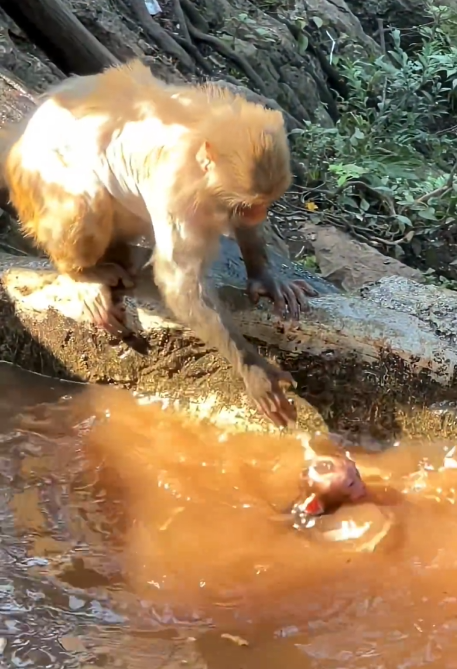
In the evenings, the jungle would quiet down, and Kiko would sit beneath the stars with Luma, reflecting on his experiences. He learned valuable lessons: some adults could be harsh, some behavior was a reflection of stress or learned survival tactics, and yet even small acts of kindness could make a profound difference. Kiko realized that parental abuse was not limited to humans; it was part of the natural world, often entwined with instinct, competition, and survival. But the jungle also demonstrated resilience—the ability of the young, like Kiko, to learn, adapt, and cultivate compassion despite hardships.
Over time, Kiko grew stronger, wiser, and more independent. He learned how to gather food efficiently, swing through the trees with confidence, and navigate the dangers of the jungle. Importantly, he also learned about empathy, support, and the subtle ways in which animals could care for one another despite experiencing neglect or abuse. Kiko’s journey highlighted the complex duality of nature: harshness and compassion, fear and trust, pain and hope.
The story of Kiko and Mara spread through the troop, serving as an unspoken lesson for other young monkeys. Even when a parent’s actions were harsh or cruel, children could find resilience, allies, and ways to survive. The jungle, with all its dangers and unpredictability, taught that abuse was not unique to humans. It was a reality in the animal kingdom as well—a lesson that survival sometimes came at the cost of tenderness, but that compassion and courage could persist against all odds.
Researchers observing such behaviors have documented that animals, like monkeys, dogs, elephants, and birds, can exhibit harsh treatment of their offspring. Stress, environmental pressures, and competition often trigger these behaviors. Kiko’s story mirrored these realities while offering hope: the young could adapt, support one another, and sometimes break cycles of learned cruelty. The jungle was a complex tapestry of survival, instinct, love, and struggle, and Kiko became a living example of resilience and compassion.
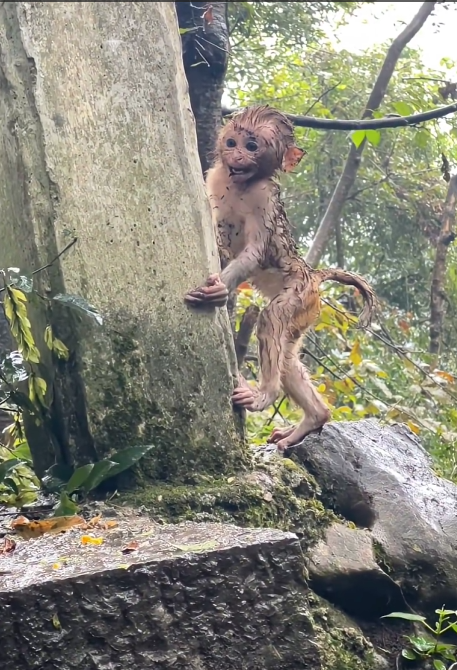
Years later, Kiko became a respected member of the troop. While Mara continued her strict ways, Kiko, now grown, used his experience to nurture younger monkeys, guiding them with patience, understanding, and gentle humor. He became a beacon of hope in a world where not all parents were kind, showing that children, whether human or animal, could overcome neglect, learn, and flourish.
Through Kiko’s life, the truth became clear: abuse is not limited to humans. It exists across the natural world, in various forms, driven by instinct, stress, and survival needs. Yet even in such environments, trust, resilience, and compassion can emerge. The jungle, full of danger and unpredictability, also harbored hope and kindness, proving that the legacy of parental care could evolve, and that young lives could flourish despite the shadows of abuse.
And so, the story of Kiko, the young monkey who faced neglect and harsh treatment yet grew to be a wise, compassionate member of the jungle, remained a lesson for all creatures: the jungle’s reality was harsh, but kindness, courage, and resilience could thrive even where abuse existed. The young, observant, and empathetic could break cycles of cruelty, offering a better future for those who came after.
